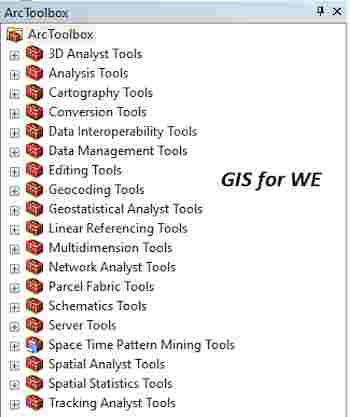Stream Link, Stream Order, Stream to Feature, Watershed Tools
Stream Link
أداة رابط التدفق
ArcMap
ArcGIS
How to use Stream Link Tool in Arc Toolbox??
كيفية استخدام أداة رابط التدفق ؟؟
Path to access the toolمسار الوصول الى الأداة
:
Stream Link Tool, Hydrology Toolset,
Spatial Analyst Tools Toolbox
Stream Link
Assigns unique values to
sections of a raster linear network between intersections.
يعيّن قيمًا فريدة لأقسام الشبكة الخطية النقطية
بين التقاطعات.
1. Input stream raster أدخل تيار
البيانات النقطية
An input raster that
represents a linear stream network.
مدخلات نقطية تمثل شبكة تيار خطي.
2. Input flow direction raster أدخل
البيانات النقطية الخاصة باتجاه التدفق
The input raster that
shows the direction of flow out of each cell.
The flow direction
raster can be created using the Flow Direction tool, run using the default flow
direction type D8.
الإدخال النقطي الذي يوضح اتجاه التدفق خارج كل
خلية.
يمكن إنشاء خطوط اتجاه التدفق باستخدام أداة Flow Direction ، ويتم تشغيلها باستخدام نوع اتجاه التدفق الافتراضي من النوع D8.
3. Output raster البيانات النقطية
المخرجة
The output stream link
raster.
This output is of
integer type.
الناتج وصلة تيار البيانات النقطية.
هذا الإخراج من نوع عدد صحيح.
Stream Order
أداة ترتيب التيار
ArcMap
ArcGIS
How to use Stream Order Tool in Arc Toolbox??
كيفية استخدام أداة ترتيب التيار ؟؟
Path to access the toolمسار الوصول الى الأداة
:
Stream Order Tool, Hydrology
Toolset, Spatial Analyst Tools Toolbox
Stream Order
Assigns a numeric order
to segments of a raster representing branches of a linear network.
يعيّن ترتيبًا رقميًا لأجزاء نقطية تمثل فروع شبكة
خطية.
1. Input stream raster أدخل البيانات
النقطية الخاصة بالتيار
An input raster that
represents a linear stream network.
The input stream raster
linear network should be represented as values greater than or equal to one on
a background of NoData.
مدخلات نقطية تمثل شبكة تيار خطي.
يجب تمثيل الشبكة الخطية لخطوط البيانات النقطية
المدخلة كقيم أكبر من أو تساوي واحدًا على خلفية NoData.
2. Input flow direction raster أدخل
البيانات النقطية الخاصة باتجاه التدفق
The input raster that
shows the direction of flow out of each cell.
The flow direction
raster can be created using the Flow Direction tool, run using the default flow
direction type D8.
الإدخال النقطي الذي يوضح اتجاه التدفق خارج كل
خلية.
يمكن إنشاء خطوط اتجاه التدفق باستخدام أداة Flow Direction ، ويتم تشغيلها باستخدام نوع اتجاه التدفق الافتراضي من النوع D8.
3. Output raster البيانات النقطية
المخرجة
The output stream order
raster.
This output is of
integer type.
ترتيب تدفق الإخراج النقطية.
هذا الإخراج من نوع عدد صحيح.
4. Method of stream ordering (optional) طريقة ترتيب التدفق (اختياري)
The method used for
assigning stream order.
·
STRAHLER—The method of stream ordering proposed by Strahler in
1952. Stream order only increases when streams of the same order intersect.
Therefore, the intersection of a first-order and second-order link will remain
a second-order link, rather than creating a third-order link. This is the
default.
·
SHREVE—The method of stream ordering by magnitude, proposed by
Shreve in 1967. All links with no tributaries are assigned a magnitude (order)
of one. Magnitudes are additive downslope. When two links intersect, their
magnitudes are added and assigned to the downslope link.
الطريقة المستخدمة لتعيين ترتيب التدفق.
• STRAHLER - طريقة ترتيب التدفق التي اقترحها Strahler في عام 1952. يزيد ترتيب التدفق فقط عندما تتقاطع التدفقات من نفس
الترتيب. لذلك ، سيظل تقاطع ارتباط الترتيب الأول والارتباط من الدرجة الثانية
ارتباطًا من الدرجة الثانية ، بدلاً من إنشاء ارتباط من الدرجة الثالثة. هذا هو
الافتراضي.
• SHREVE - طريقة ترتيب التدفق حسب الحجم ، اقترحها Shreve في عام 1967. يتم تعيين مقدار (ترتيب) لجميع الروابط التي لا تحتوي على روافد. الأحجام هي منحدر مضاف. عندما يتقاطع رابطان ، تتم إضافة مقاديرهما وتعيينهما إلى ارتباط منحدر.
Stream to Feature
أداة التيار الى
معلم
ArcMap
ArcGIS
How to use Stream to Feature Tool in Arc Toolbox??
كيفية استخدام أداة التيار الى معلم ؟؟
Path to access the toolمسار الوصول الى الأداة
:
Stream to Feature Tool, Hydrology
Toolset, Spatial Analyst Tools Toolbox
Stream to Feature
Converts a raster
representing a linear network to features representing the linear network.
يحول البيانات النقطية التي تمثل شبكة خطية إلى معالم
تمثل الشبكة الخطية.
1. Input stream raster أدخل البيانات
النقطية الخاصة بالتيار
An input raster that
represents a linear stream network.
مدخلات نقطية تمثل شبكة تيار خطي.
2. Input flow direction raster أدخل
البيانات النقطية الخاصة باتجاه التدفق
The input raster that
shows the direction of flow out of each cell.
The flow direction
raster can be created using the Flow Direction tool.
الإدخال النقطي الذي يوضح اتجاه التدفق خارج كل
خلية.
يمكن إنشاء خطوط اتجاه التدفق باستخدام أداة Flow Direction.
3. Output polyline features معالم
الخطوط المتعددة المخرجة
Output feature class
that will hold the converted streams.
فئة ميزة الإخراج التي ستحتوي على التدفقات
المحولة.
4. Simplify polylines (optional) تبسيط
الخطوط المتعددة (اختياري)
Specifies whether
weeding is used.
·
Checked—The feature is weeded to reduce the number of vertices.
The Douglas-Puecker algorithm for line generalization is used with a tolerance
of sqrt(0.5) * cell size.
·
Unchecked—No weeding is applied.
By default, weeding is
applied.
يحدد ما إذا كان يتم استخدام إزالة الأعشاب الضارة
أم لا.
• تم التحديد - تمت إزالة
الميزة لتقليل عدد الرؤوس. تُستخدم خوارزمية Douglas-Puecker لتعميم الخط بتفاوت قدره sqrt (0.5)
* حجم الخلية.
• لم يتم التحقق منه — لا
يتم تطبيق إزالة الأعشاب الضارة.
بشكل افتراضي ، يتم تطبيق إزالة الأعشاب الضارة.
Watershed
أداة تجمعات
للمياه
ArcMap
ArcGIS
How to use Watershed Tool in Arc Toolbox??
كيفية استخدام أداة تجمعات للمياه ؟؟
Path to access the toolمسار الوصول الى الأداة
:
Watershed Tool, Hydrology
Toolset, Spatial Analyst Tools Toolbox
Watershed
Determines the
contributing area above a set of cells in a raster.
تحدد المنطقة المساهمة أعلى مجموعة من الخلايا في
البيانات النقطية.
1.
Input flow direction raster أدخل
البيانات النقطية الخاصة باتجاه التدفق
The input raster that
shows the direction of flow out of each cell.
The flow direction
raster can be created using the Flow Direction tool, run using the default flow
direction type D8.
الإدخال النقطي الذي يوضح اتجاه التدفق خارج كل
خلية.
يمكن إنشاء خطوط اتجاه التدفق باستخدام أداة Flow Direction ، ويتم تشغيلها باستخدام نوع اتجاه التدفق الافتراضي من النوع D8.
2.
Input raster or feature pour point data أدخل البيانات النقطية او مصدر نقطة التجميع
The input pour point
locations.
For a raster, this
represents cells above which the contributing area, or catchment, will be
determined. All cells that are not NoData will be used as source cells.
For a point feature
dataset, this represents locations above which the contributing area, or
catchment, will be determined.
مواقع نقطة الإدخال.
بالنسبة إلى البيانات النقطية ، يمثل هذا الخلايا
التي سيتم تحديد المنطقة المساهمة أو مستجمعات المياه فوقها. سيتم استخدام جميع
الخلايا التي ليست NoData كخلايا مصدر.
بالنسبة لمجموعة بيانات المعلم النقطي ، يمثل هذا
المواقع التي سيتم تحديد المنطقة المساهمة أو مستجمعات المياه فوقها.
3.
Pour point field (optional) حقل
نقطة التجميع (اختياري)
Field used to assign
values to the pour point locations.
If the pour point
dataset is a raster, use Value.
If the pour point
dataset is a feature, use a numeric field. If the field contains floating-point
values, they will be truncated into integers.
يُستخدم الحقل لتعيين قيم لمواقع نقطة التدفق.
إذا كانت مجموعة بيانات نقطة الصب عبارة عن خطوط
نقطية ، فاستخدم القيمة.
إذا كانت مجموعة بيانات نقطة الصب ميزة ، فاستخدم
حقلاً رقميًا. إذا كان الحقل يحتوي على قيم فاصلة عائمة ، فسيتم اقتطاعها إلى
أعداد صحيحة.
4.
Output raster البيانات النقطية
المخرجة
The output raster that
shows the contributing area.
This output is of
integer type.
الناتج النقطي الذي يظهر المنطقة المساهمة.
هذا الإخراج من نوع عدد صحيح.
اليك صفحه ومجموعة على الفيس بوك لتعلم أكثر بما يخص نظم المعلومات الجغرافية (GIS) و برنامج ArcGIS Pro من خلال هذه الروابط:








تعليقات
إرسال تعليق